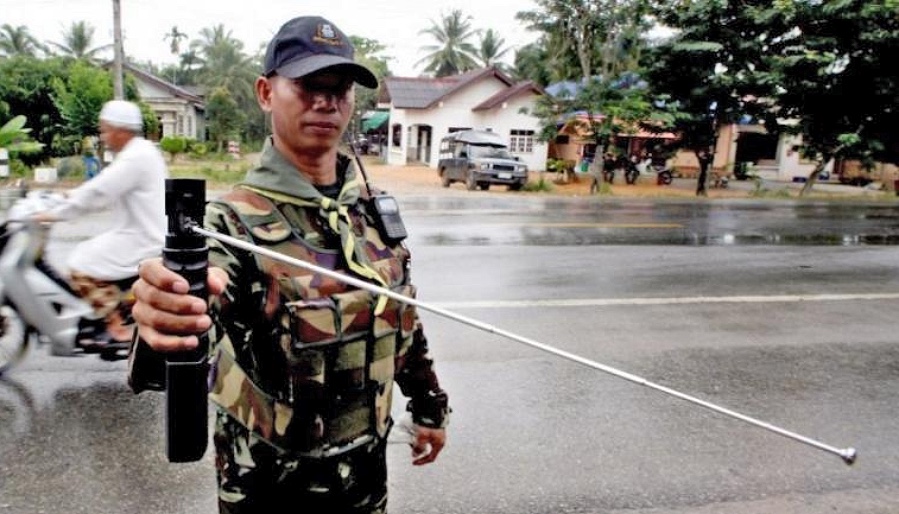Not only could it NOT detect a bomb, or anything for that matter, the best it could do would be to poke out your eye. But it cost the Thai government over 1 billion baht.
The GT200, a device that was once considered a vital tool in the armory of security forces in many countries across the globe, is now synonymous with fraud, hoax, and corruption. This device was meant to detect explosives, narcotics, and other illicit substances. But it was just an empty plastic handle with two bit of metal antenna attached.
The only thing it could detect were gullible Thai officials who paid for the dud devices.
The manufacturer of the GT200 was UK-based Global Technical Ltd, which made false claims about the product. Its claims attracted buyers from Thailand, Saudi Arabia, Hong Kong, Indonesia, Mexico and other countries.
Thailand was one of the countries that was lured into buying the GT200. Thai authorities spent more than 1.13 billion baht on purchasing 1,354 GT200 devices between 2005 and 2010. Even Thailand’s most prominent forensic expert, Dr Porntip Rojanasunan, who is now a senator, supported GT200 procurement. This decision has now returned to haunt her.
Launched in 2001, the GT200 was touted as a detector of explosives, narcotics, and other illicit substances. The manufacturer attracted buyers from Thailand, Saudi Arabia, Hong Kong, Indonesia, Mexico, and elsewhere with false claims. The device was similar in construction to two other fake detectors, the ADE-651 and the Alpha 6.
Sales demonstrations of the GT200 would be rigged to succeed, with anyone skeptical of the devices publicly humiliated, according to the BBC. Users were also instructed not to open the device as this could damage the “sensitive technology” inside. However, experts who finally opened the devices quickly concluded they were little more than empty boxes.
Assoc Prof Jessada Denduangboripant of Chulalongkorn University’s Faculty of Science was among the first in Thailand to question the devices. He likened the GT200 to a dowsing rod with no scientific validity and said any success from using it was the result of random chance.
The Royal Thai Air Force kicked off the GT200 trend in Thailand. It imported the device for use at Pattani Airport, which in turn attracted interest from the Royal Thai Army. In 2005, the Army bought four GT200 devices along with 20 so-called sensor cards from a Thailand-based agent for 1.2 million baht per unit.
After the Air Force began using GT200 detectors in the insurgency-plagued deep South, other agencies showed interest in buying the device. The GT200 was credited for detecting explosives on many occasions in the deep South.
However, suspicions about the GT200 rose in late 2009 when the device failed to detect a car bomb that killed one person and injured dozens in Narathiwat’s Sungai Kolok district. Two weeks later, skepticism surged after it failed to thwart another bomb attack in Yala province.
As doubt grew over the GT200 in Thailand the UK government announced in January 2010 that the device was “wholly ineffective” and warned foreign governments against using it.
Essentially, it was a black plastic box with two cheap, rotating antennas – that’s about it. It didn’t even have any electronics inside the black plastic handle.
The Thai government led by Abhisit Vejjajiva assigned the Ministry of Science and Technology to conduct tests on the GT200. The results showed GT200’s success rate was no higher than random chance. Not surprisingly, the device also proved less effective than sniffer dogs at detecting explosives and drugs.
Critics described the huge budget spent on the GT200 as a “stupidity fee,” which was funded by taxpayers.
The Army also spent 7.5 million baht last year for tests on 757 of its GT200 devices, which were reportedly conducted to support its lawsuit against the supplier.
In the UK, several people were sentenced to jail over the GT200 and similar fake devices.
In Thailand, the National Anti-Corruption Commission (NACC) has ruled that nearly 100 suspects are guilty of disciplinary and criminal offences over their roles in the procurement of GT200s – most were members of GT200 procurement committees at various government agencies.
No one has yet been identified over the procurement fraud or taken responsibility for spending 1 billion baht on a device that was never going to work – a fact any 6 year old would have been able to figure out in 2 minutes.









